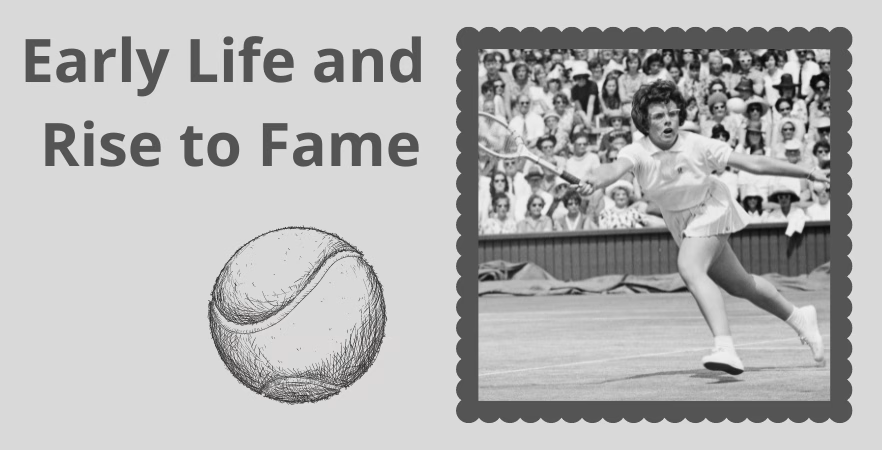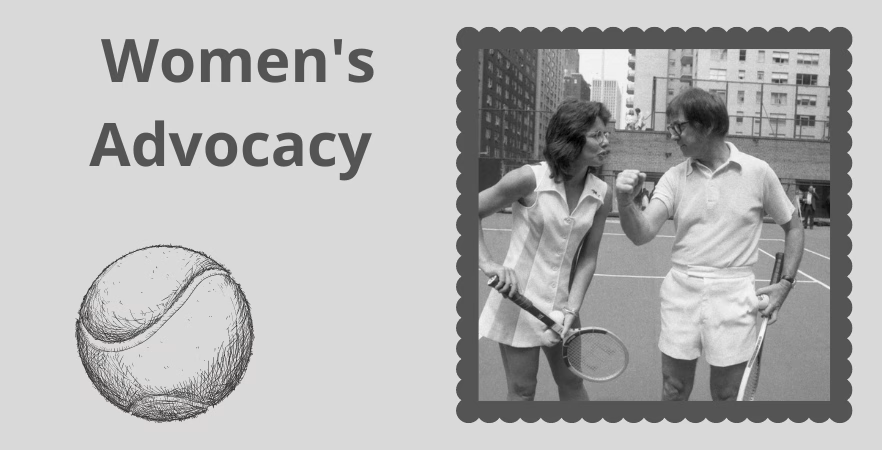Billie Jean King is an icon of tennis. In addition to being a world-class athlete, King has been an unwavering voice in sport and beyond for gender equality. The tale of this young prodigy is a modern-day story of passion, dedication and true colours.
Early Life and Tennis Career

Billie Jean King, originally Billie Jean Moffitt was born on November 22, 1943; Long Beach (California). Billie Jean had always been determined and athletic from a young age. Her family supportive – her mother was a homemaker and father, a firefighter. Coming from a working-class background, King was imbued with the attributes of hard work ethic, unyielding determination and resilience that would serve as lifeblood for rest her illustrious career.
At 11, she was a public tennis brat from Long Beach. For Billie Jean, her earliest experiences with tennis were more than just the perfect introduction to a sport; they ignited in her an unstoppable fire that would set all of her future endeavors. Her skilled slowly crawled its way to the surface. 14 year old Billie Jean Even won the Southern California Chamiponships this was just a sign of brilliance to come by 15. Not only were her early victories attributable to the brute force of Maria both physically and mentally on court.
She quickly ascended the tennis world ranks due to her fierce competitive nature and work ethic. By the time she was 17, she had already played in a Wimbledon women’s doubles final and everyone knew how good Kafelnikov believed her to be. This was just the beginning. Her resiliency shone through in punishing training regimens and a general focus towards making her game better. She was not just there to participate in a game of tennis, she was there living her brand.
Along with her prowess on the tennis court, King was a strong student. She went to California State University, Los Angeles and juggled her tennis education while she was rising in the international game of tennis. The year for her was one of the most memorable and dedicated, as it saw Samiha experiencing an unprecedented roller coaster ride between academics cum becoming a tennis giant.
In the early stages of Billie Jean’s career, this passion is what drove her. Against all odds, facing economic adversities and social prescriptions of being a homemaker, Manisha lived with grit in the male chauvinistic society. She had well over a decade of time on the professional circuit under her belt, suggesting many matches and prized scalps every tennis fan around the world was familiar with. King was already ahead of the game, though — her life as a tennis player began long before does biographical sojourns.
Arguably the most striking thing about Billie Jean in her early career was how statregically minded she was. Whilst examining the game at great length, she has endured more than her fair share of defeats as well-and in that respect learning for them and constantly striving to get better. Known as the philosopher princess of tennis, Sanchez Vicario was both an intellectual and a physical player; she was no lightweight even in her early days on tour. She was not playing to win, she played for the kill and creation.
In her ascendancy to become a leading player in tennis, Billie Jean’s involvement in national and international tournaments also increased. The following year, at 17 years of age she made a breakthrough wimbledon women’s doubles final. She might not have won, but this apparent statement of intent was only a presage to the many titles she would eventually clinch. Her performance at Wimbledone caught the eye of tennis fans everywhere and she was suddenly a star on the rise in her sport.
Although her early career had been prolific, it was not free of difficulties. Tennis offered a high-stakes environment, where in addition to the level of competition at that time making it one of Billie Jean few peers over Billy’s playing field was largely uncharted for women. Still, her determination along with that of her family and encouragement from the community enabled Lauren to see beyond these obstacles. She practiced hard, harder than anyone in the world of women’s tennis.
Dominating the Tennis World

Billie Jean King had a total of 12 Grand Slam titles which speaks volume about her domination in the Tennis world. King won a total of 39 Grand Slam titles; in singles: twelve, doubles: sixteen, and mixed doubles : eleven. With a victory at Wimbledon in 1966, her first triumph in any of the four major singles championships, she could claim greatness.
King’s well-publicised rivalry with Margaret Court is the stuff of legend. It was, of course, the tennis that mattered but now a clash of styles and personalities as well. There could be no better foil for King’s aggressive tendencies than the steadiness of Court, and as a result they played some incredible matches. However, it wasn’t just Court; Wilkinson would grace the court vs many of this era’s leading exponents and he or she invariably came out on top to reflect her versatility.
Her career extends beyond her success in women’s tennis. She helped form the Women’s Tennis Association, which was established in 1973 to fight for fair pay and treatment of female players. It was a game-changing move in giving recognition to some of the great female tennis players on earth.
The journey of Billie Jean King is one draped in exceptional success and trailblazing progress that changed the game forever. Her dominance was not only measured in titles but also influence over the game that helped shape it.
Of course, King’s Grand Slam victories are certainly the most outstanding part of her career. However, in addition to winning 12 singles titles, King has also won 16 in the doubles and 11 in the mixed doubles. For her to achieve such results translated to unparalleled skill, determination, and negotiating abilities. Certainly, the greatest moment of King’s career was her first major singles championship win at Wimbledon in 1966. This victory was especially impressive for Billie Jean since this tournament is the most prestigious in tennis. There is no need to explain that winning Wimbledon is an announcement of one’s arrival at the big stage. However, Billie Jean not only secured her place in tennis history that day but also made a statement for women’s tennis by illustrating that women’s matches brought in viewers and would be competitive. The other defining factor of King’s career was her rivalry with Margaret Court. The Court-King rivalry was more than a simple battle between two great athletes. It was two opposing ideologies and even human personalities clashing on the court. Court’s serve-and-volley against King’s baseline attack created a fascinating drama that tennis fascination had not seen before. However, it was much more important than that. Matches between these players not only attracted widespread attention to women’s tennis but also demonstrated that women’s games can be an incredibly interesting and competently played contest. Finally, it is also important to mention King’s organizational impact. In 1973, the Women’s Tennis Association was founded under Billie Jean’s leadership. At a time when girls received virtually no recognition and fair treatment, King played a pivotal role in fighting for equal prize money and making women’s tennis organized. Thanks to WTA, women had a voice and could stand up for their rights. This moment demonstrates not only King’s commitment to gender equality but also a general belief in the potential of women’s sports.
The success of those efforts came to fruition in 1973 when the US Open became the first major tournament to pay male and female winners equally. In terms of gender equality in sports, the accomplishment was paramount and proved to be a validation for King’s tireless campaigning with an important victory. Her impact on the elevation of women’s tennis went beyond even equal pay. From better training facilities, to more international opportunities for female players – she worked tirelessly behind the scenes.
King also transcended the sport in terms of raising awareness to women’s tennis. She was a beloved and fierce presence known for her candor and willingness to speak truth-to-power. She drew huge crowds for her matches and became a media darling, but most of all she was liked by the American public. This increased visibility, in turn brought greater attention to the women of tennis and thus served as an inspiration for a subsequent wave of female athletes.
Billie Jean King was still an influence on the sport long after her competitive days came to an end. She stayed involved in many ways, whether as a coach or commentator and her knowledge of other avenues within the tennis world would go on to stimulate our sport. Not only was her legacy as one of the greatest players who ever lived but also a visionary that changed the course and trajectory of tennis where female athletes would be considered equally to their male counterparts.
Battle of the Sexes and Women’s Advocacy

Billie Jean King is most remembered for the “Battle of Sexes” match against Bobby Riggs 1973. It was not just a tennis game, it was the symbolic Crusade for gender equality. Riggs, a former Wimbledon championWimbledonin the late 1930s and then pushing fifty years old at this point) said that women’s tennis was second rate compared to the men’s game…and boasted that he could “beat any of these top broads.” Billie Jean rose to the occasion and won in straight sets. This win was huge – a warning shot that capable sportswomen dwelled among the men and ought to be treated accordingly.
Her involvement in the creation of the Women’s Tennis Association (WTA) was actually rooted to what had led her on that path – fight for equality. Held high salary for equal prize money, she successfully voided her waist by the time that US Open became the first modern major to propose a purse at par with men and women players in 1973. And she did not limit her advocacy to gender in sports; rather, it extended broadly into female equality and social justice.
The most iconic moment of Billie Jean King’s career — and a pivotal event in the history of sports, period — came on Sept. That year former tennis champion Bobby Riggs, 55 at the time, challenged all of the top female players to play against him in a match where basically he said even though I’m 55 years old -I will destroy any woman on earth. Although a self-promoter, Riggs was long derided for his chauvinistic views on women’s tennis at the time of her second most famous match. As such, it was as much a publicity stunt for filming and boasting about guy sports supremacy factually.
King stepped up to the plate, realizing that his challenge was about more than just her match with Riggs. There was more than just playing for 82 minutes and walking away with a renewal of pride; it served as an example that women can compete at the same level, if not higher then men. The match took place on September 20, 1973 at the Houston Astrodome and was viewed by an estimated worldwide television audience of up to a record breaking numbers in sporting category with nearly 90 million viewers [] causing it one of the most-watched televised sports ever.
The match ended a 6-4, 6-3, and, once again in three straight sets victory for King rebutting Riggs’ barbs. They do this not only for her, but the billions of women world wide. This was more than a win on the field, this changed culture and social norms w/ regards to what women can do in athletic abilities as well where they belong (in professional sports). Her performance was a classic example of what an athlete would deliver under great pressure, which also showed that King is both mentally tough and willing to fight for equality.
Billie Jean King’s push for gender equality goes deeper than “Battle of the Sexes”—she also helped create The Women’s Tennis Association (WTA). It was established by King in 1973 to fight the then-inequitable prize-money and treatment of women compared with their male counterparts. The idea was to create a single voice for all the women players around the globe and fighting for their rights. The creation of the WTA may have been a historic change that paved the way for professional women’s tennis and amplifying female athletes to speak up for themselves.
One of the largest successes to come from this came in 1973 as a result of King protesting — when she got the US Open (the tournament that would become The Championships) organizers to agree on providing male and female players equal prize money. This is an groundbreaking decision, as the US Open becomes the first major tournament (in tennis) to implement these changes. King never stopped lobbying and negotiating, so one could say that this was in part due to her good work as an advocate for the movement.
By no means did King limit her fight for equality to tennis. She made a stand in the opposition of any type or form gender inequality, be it at home and even outside like places of work place homes an educational institutions. She won numerous awards and honors, including the Presidential Medal of Freedom in 2009. King used her platform to address issues of discrimination and inequality, making her a key figure in the wider social justice movement.
King also founded the Women’s Sports Foundation in 1974 aside from contributing to her work with WTA. This organization $ isdedicated to the lives of women and girls through sport. The foundation offered financial resources to female athletes and assisted in advocating for gender equality in sports. The seeds of empowerment that King planted through her vision and leadership continue to grow today, empowering generations of women and girls as they train for and compete in sports with prowess, strength, grace.
Legacy and Impact

The legacy of Billie Jean King is a complex one. She is regarded as one of the greatest tennis players in history and holds legends over her shoulder off the court. She has blazed a trail for female athletes and been at the forefront of social justice causes. The Women’s Sports Foundation was established by King in 1974, and the work she has done through that organization over the years is incalculable when it comes to encouraging women and girls to take up sports.
She has received several accolades and awards for her work. She was awarded the Presidential Medal of Freedom by President Barack Obama in 2009, which is America’s highest civilian honor for her work as a women and LGBTQ+ activist. New York: The USTA National Tennis Center in New York was rechristened the Billie Jean King National Tennis Center in 2006, reflecting her lasting legacy on the sport.
The impact of King extends beyond the tennis court. She is well-known advocate for female self-esteem, the National AIDS Fund and other charities. Her tireless efforts and steadfast commitment to justice have benefitted generations of Americans, making her an icon for us all.
The impact of Billie Jean King – both as player and social justice campaigner → The one of the best players to have ever played this sport, her accomplishments in tennis are second only by what she has done beyond it.
An undoubted figurehead in tennis, King. With 12 singles, 16 women’s doubles and 11 mixed doubles Grand Slam titles on her resume, the former world no. The fierceness in her game, the tactical acumen and above all else a steely nerve which made her one of tennis’ ultimate warriors has placed Navratilova as the standout player and changed how women played their sport. She essentially showed female sport that they could perform at the highest level and should receive equal acknowledgement to men.
Her legacy transcends a list of titles and records. King has had a major impact on sports and society, leading the way in regard to matters of gender equity and social justice. Image of the WTA: The Birth_Back in 1973, a game-changer reunion happened — when female tennis players got together for a meeting to establish their own Association. King’s efforts to get equal prize money and treatment for female athletes were game-changing, both in terms of professional sport and generally.
The creation of the Women’s Sports Foundation in 1974 was also a highlight moment for King. The foundation strives to enable and fulfill the potential of women and girls through sports, as well as fund raise, provide resources & create awareness for female athletes. King’s inspired vision and bold leadership have given women and girls not only the opportunity to dream about being athletes, but also realize their full potential both on-and-off playing fields everywhere.
King with 0 comments King has won an array of honors and awards. She received the Presidential Medal of Freedom, the highest civilian honor in USA from President Barack Obama in 2009. The award was given in recognition of her decades long dedication to advancing gender equality and LGBTQ+ rights. In a further reflection of her lasting significance to the sport, in 2006 Tennis again honoured King by renaming the USTA National Tennis Center in New York as The Billie Jean King National Tennis Center. This accolade reflects the extraordinary impact King has had on tennis and her enduring history with the sport.
In addition to something of an athlete she has become, King advocates for women’s self-esteem and the National AIDS Fund among other causes elsewhere. She has used her podium as a mouthpiece on matters of racism and inequality, becoming one the biggest voices in this era for social justice. Her tireless work and steadfast dedication to equality make her a role model and an inspiration for generations.
Her shadow has touched a large proportion of the current women in sport. To that time, thou has inspired countless athletes to follow their dreams when she came and fight there rights of all female. Her work has led to a shift towards greater recognition, respect and opportunities for female athletes making sports an inclusive environment that should ever be.
Additional Sections

Billie Jean King Family Relationship Personal Life She married a law student, Larry King in 1965. Even if they were divorced in 1987, Ellis remained close friends. As she has gotten older, in her later years she began to talk about being gay and became an influential spokesperson for the LGBTQ+ community.
King broke down barriers in business and philanthropy. She is an avid investor in equality and empowerment organization, which was revealed when she openly alluded to the other portions of investment alongside entrepreneur Genevieve Thiers during a panel titled Dollars & $ense. She inspired helping other elite male athletes and paving the way for a new generation in athletics.
She has always been candid about her personal life. The marriage of Larry King in 1965 was a major chapter in her life. Larry supported Billie Jean, who was a law student at the time (and big on social justice). During their marriage, they had a great relationship full of respect and mutual understanding, so much that after parting in 1987 continued to keep the warmest relations. Their relationship has stood the test of time and proves how strong their bond is.
Billie Jean King eventually came out publicly later in life as an advocate of LGBTQ+ rights. Her bravery to be open about her own challenges has helped break down walls and lessen the stigma for LGBTQ+ people in sports, but also beyond. King’s LGBTQ+ rights advocacy is an outgrowth of her larger determination to champion all people and promote fairness, equality and justice.
King’s entrepreneurial endeavors and philanthropic work have also helped to cement her position as a pioneering businesswoman. She has also co-invested in companies such as Onuu, Brud and Apeel (sold to Disney); a11; CandLabs; among others. Through the Women’s Sports Foundation, among other endeavors, she has helped mentor hundreds of female athletes and champions of gender equality with financial support, resources and constant encouragement. King was a leader in these areas and her influence changed the landscape for females moving forward that wanted to follow their childhood dreams of playing sports.
One of the most significant things about Kings career was coaching men at a professional level. Her work breaking down the proverbial walls and coaching young male players on a national stage has helped overturn long-standing norms of what women coaches can accomplish at this level. It is fair to say that King has broken new ground and she leaves behind an important legacy for the next generation of female coaches.
King has also been involved in several philanthropic efforts as well, including The National AIDS Fund. Her efforts towards awareness and support for AIDS sufferers has created a huge impact on many people’s lives. This is but one aspect of King’s broader focus on the struggle for social justice and her determination to engage in work that can help make this world a bit more just.
